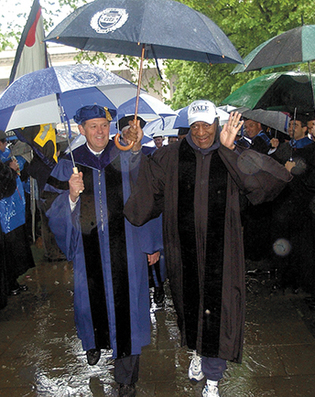 loading
loading
Light & VerityHonorary degree for Bill Cosby is rescindedYale says it waited for him to be “afforded due process.”  Associated PressBill Cosby marches in the procession at Yale’s 2003 commencement. View full imageNearly every year at commencement since the first one in 1702, Yale has awarded honorary degrees to notables. These have ranged from George Washington (1781) to Willie Mays (2004), more than 2,800 in all. But until this May, the university had never taken one back. Yale’s board of trustees voted this spring to rescind the Doctor of Humane Letters degree awarded to actor Bill Cosby in 2003. In a May 1 statement, the university said its decision to rescind Cosby’s degree was “based on a court record providing clear and convincing evidence of conduct that violates fundamental standards of decency shared by all members of the Yale community, conduct that was unknown to the board at the time the degree was awarded.” Cosby’s work as an entertainer and an advocate for children and education had inspired dozens of universities to award him honorary degrees. But as sexual-assault accusations by many women became widely known over the last three years, a number of institutions retracted the degrees they had conferred. Yale officials declined to consider (at least to consider publicly) the possibility of following suit—until Cosby was convicted in April of three counts of aggravated indecent assault. “The board took this decision following Mr. Cosby’s criminal conviction after he was afforded due process,” the Yale statement explains. “Yale is committed to both the elimination of sexual misconduct and the adherence to due process. We reaffirm that commitment with our action today.” A group of 30 alumni—mostly from the Class of 1964—wrote to President Peter Salovey ’86PhD and the board during Cosby’s trial, asking that Yale rescind both Cosby’s degree and the 1996 Doctor of Humane Letters awarded to Stephan Schmidheiny. The group is led by Daniel Berman ’64, an occupational safety researcher. Yale had honored Schmidheiny, a Swiss billionaire industrialist, for his work to “promote stewardship of the global environment.” From 1976 to 1990 Schmidheiny had run the family business, Eternit; it made construction materials, some containing asbestos. His official biography says he transitioned Eternit out of asbestos after he took over. He later moved into environmental activism and philanthropy. In 2012, Schmidheiny was convicted by an Italian court of contributing to thousands of asbestos-related deaths in and around a factory his family owned in the 1970s and ’80s. He was sentenced to 18 years in prison, but the conviction was overturned because it violated a statute of limitations. Another trial is currently under way in Turin in which Schmidheiny is charged with manslaughter in two more-recent asbestos-related deaths. “The committee that selected Schmidheiny back in 1996 didn’t know the extent of what he had done,” says Berman. Now that Yale has set a precedent with Cosby, he adds, “they should pull his degree. I think this is an embarrassment to Yale and a disgrace.” “The university is not considering Stephan Schmidheiny’s honorary degree,” Yale spokesman Tom Conroy said in early June. “Any decision about rescinding an honorary degree would be made by the board of trustees. We expect such decisions would be exceedingly rare.”
The comment period has expired.
|
|